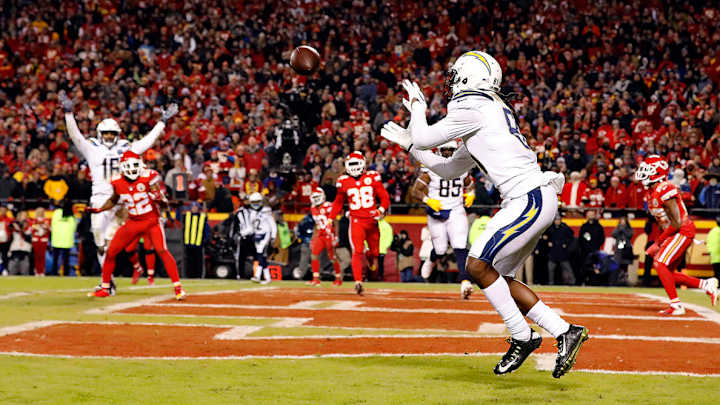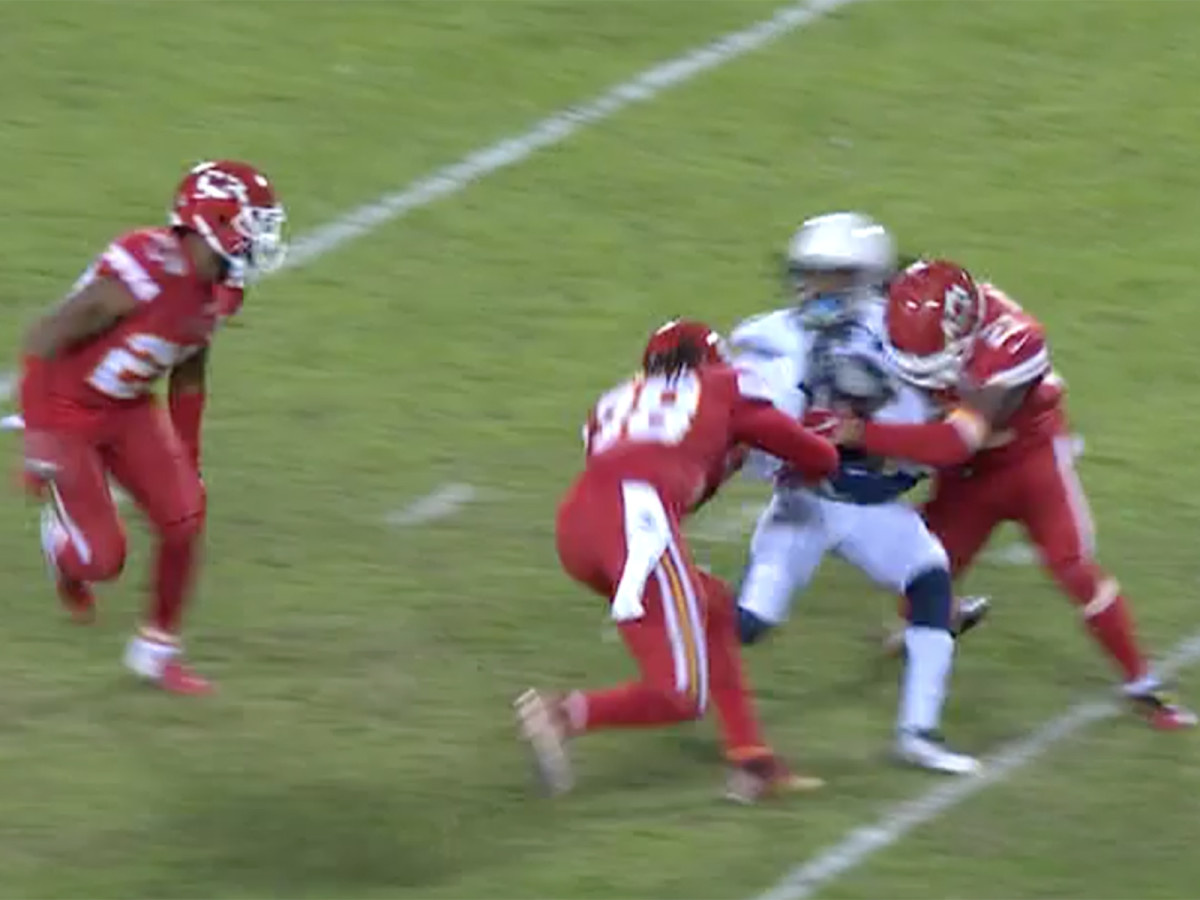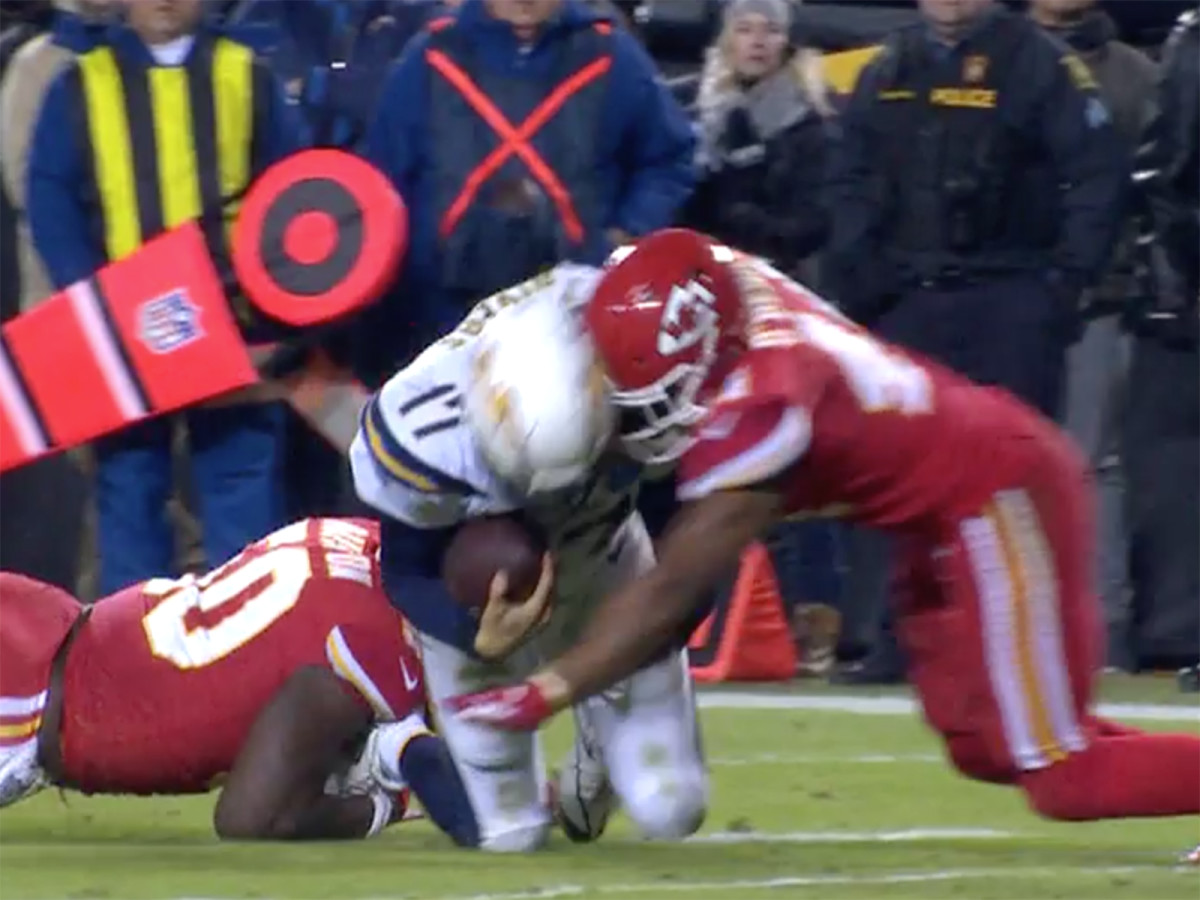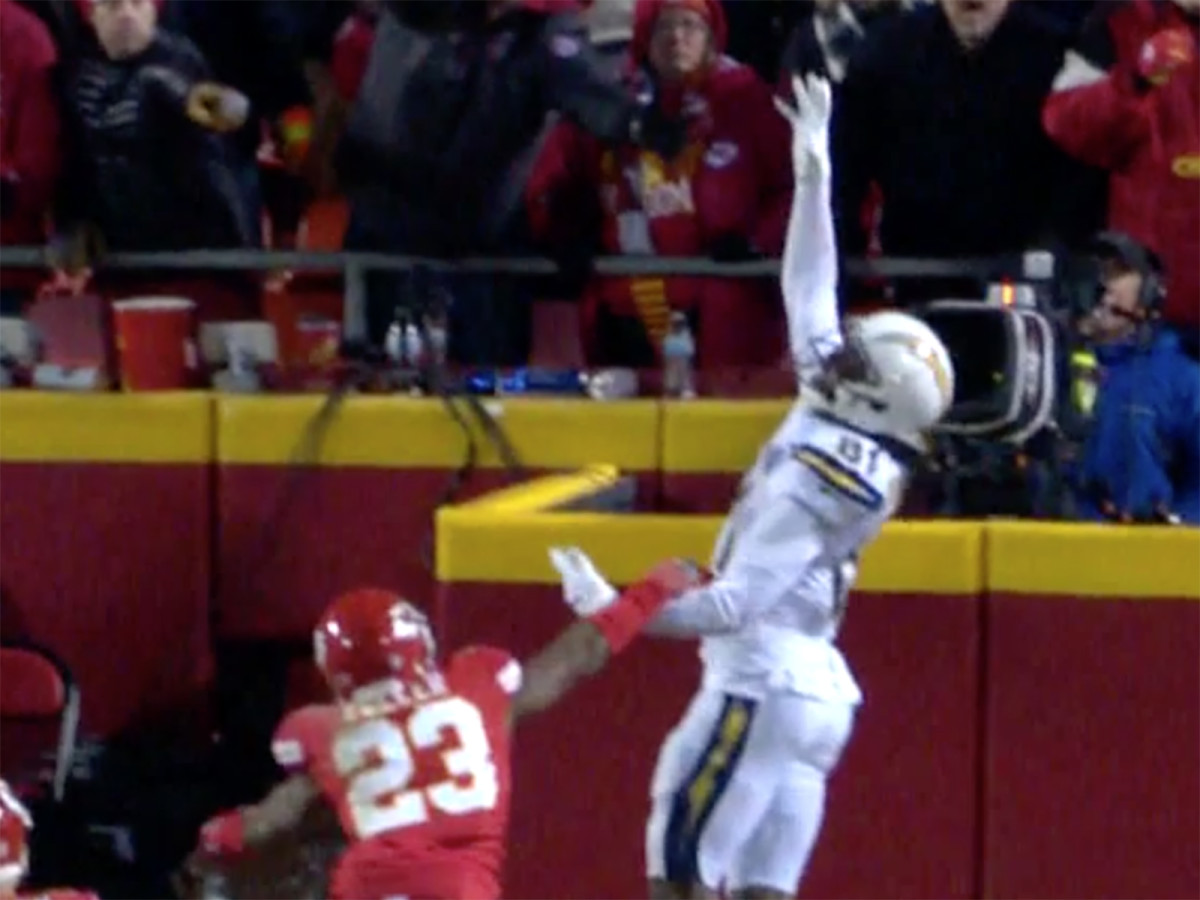Stunning Chargers Win at the Buzzer Saves Officials in Choppy Thursday Night Thriller

It was hard not to view this breathtaking ending as a victory for Thursday night’s officiating crew as well as the Chargers.
Through the weekend, we will (rightfully) discuss the fortitude displayed by Coach of the Year frontrunner Anthony Lynn, who went for the two-point conversion to stun the Chiefs 29-28 at home and jar open a race for the AFC West crown that many thought was decided a month ago. We will talk about the play call itself, which left the night’s most dominant receiver, Mike Williams, by himself in the end zone while three Kansas City defenders converged on Tyrell Williams (he threw his hands in the air, celebrating before the ball was even caught.)
Therefore, we might be a little distracted from the fact that the final 16 minutes and 10 seconds of that game felt like a busted luge ride through the NFL rulebook. We’ll remember Philip Rivers running off the field like a jubilant cattle wrangler, and forget him at his wits end begging the officiating crew to call a defenseless player helmet collision from just a few plays earlier.
It was hard not to feel for Rivers back at the 16-second mark as he wandered around the Arrowhead Stadium sod with his hands waving in the air. Nevermind that officials missed what looked to be a different helmet-to-helmet infraction from Chiefs defensive back Ron Parker a few plays earlier on a pass over the middle to Travis Benjamin at the two-minute mark. Parker appeared to establish linear body posture, and had a clear path toward the wide receiver (though a sympathetic observer could argue that, because the collision occurred on the side of Benjamin’s helmet that Parker was trying to avoid the hit).

Rivers’s was more blatant. His helmet wobbled in recoil from the Dorian O'Daniel collision. It was initially described on the broadcast as a shoulder-first hit, until an end-zone angle revealed a thud that led former officiating head and current FOX rules analyst Mike Pereira to say: “[Rivers] is a player on the ground, he’s defenseless, so he gets that protection to the head or neck area. Yep, he’s got a legitimate gripe. ”
Joe Buck added: “Stunned that there was no flag on that helmet-to-helmet hit by Dorian O’Daniel.”

What followed was one of the more obvious make-up calls in recent history. The ensuing pass to Mike Williams drew a flag, initially described by Buck as offensive pass interference (“a pushoff by Mike Williams”). Kendall Fuller and the Chiefs secondary looked stunned. Andy Reid shook his head.
Said Troy Aikman: “If that’s what they’re calling on him, there’s no grab…it’s in slow motion, I don’t see anything there.”
Added Pereira: “Well, that’s exactly what [the officials] are told to look for. The one-handed extension to see if there’s any pull-down on the arm and that’s what the back judge is calling. It doesn’t seem like a lot, but if he can’t get that arm up….”

In short, that’s how you pinball into a game-ending touchdown. It’s a shame because both offenses are beautiful and fluid on their own, but most of the entire final quarter of this game was chopped up by one questionable flag after another.
The Chiefs’ would-be knockout drive began with 1:10 remaining in the third quarter. Patrick Mahomes took a shotgun snap, buzzed a swing route behind the line to Tyreek Hill and nearly halved the distance they’d have to go on the next snap to get a first down. On second-and-6, they were called for a holding penalty, moving them all the way back to the 22.
They seemed doomed for an uneventful series, that is, until the flags started flying the other way. Over the next 16 snaps on a 13-play drive, five more penalties were called. Some, like the offsetting offsides and illegal motion calls on a pass that bounced off Hill’s helmet in the end zone, were obvious. A necessity. Others may have been an a little bit of a stretch.
Justin Jones was called for a facemask on Mahomes at the 15-minute mark of the fourth quarter, almost simultaneously while Joey Bosa was getting his shoulder pads removed by a Chiefs offensive linemen. Chargers defensive back Desmond King was called for defensive holding at the 14:26 mark. In real time, he looked to be attacking Chiefs tight end Travis Kelce with the ferocity of a bashful teenager at a high school dance.
The third-down holding penalty that kept KC’s fourth scoring drive alive. Get out of the way, zebras. pic.twitter.com/caPZMmGWhN
— Dan Hanzus (@DanHanzus) December 14, 2018
At the 11:30 mark, Jatavis Brown was flagged for holding Hill, giving the Chiefs another automatic first down.
Aikman, on that drive, openly griped about the number of calls that were leading to drive-sustaining first downs.
It is true that, before the advent of high-definition cameras that can track a fleck of grass bouncing off a player’s cleat, we worried less about the officiating because we couldn’t see it. There were incredible moments in league history that, had they been addressed by the letter of the law, would have been erased altogether. It’s also true that we have a lot of nerve complaining about something that we would never be able to see on our own in real time without the view these cameras provide (and even then, without a secondary screen and some slow-motion technology). It is also true that we’ve been gifted with one of the greatest offensive seasons in NFL history, and we should probably stop complaining.
However, when something is capable of being played like a flawless symphony, but sputters out like an old record skipping and popping on the turntable, it’s jarring. Thankfully for everyone, the symphony returned for one last two-point conversion.
